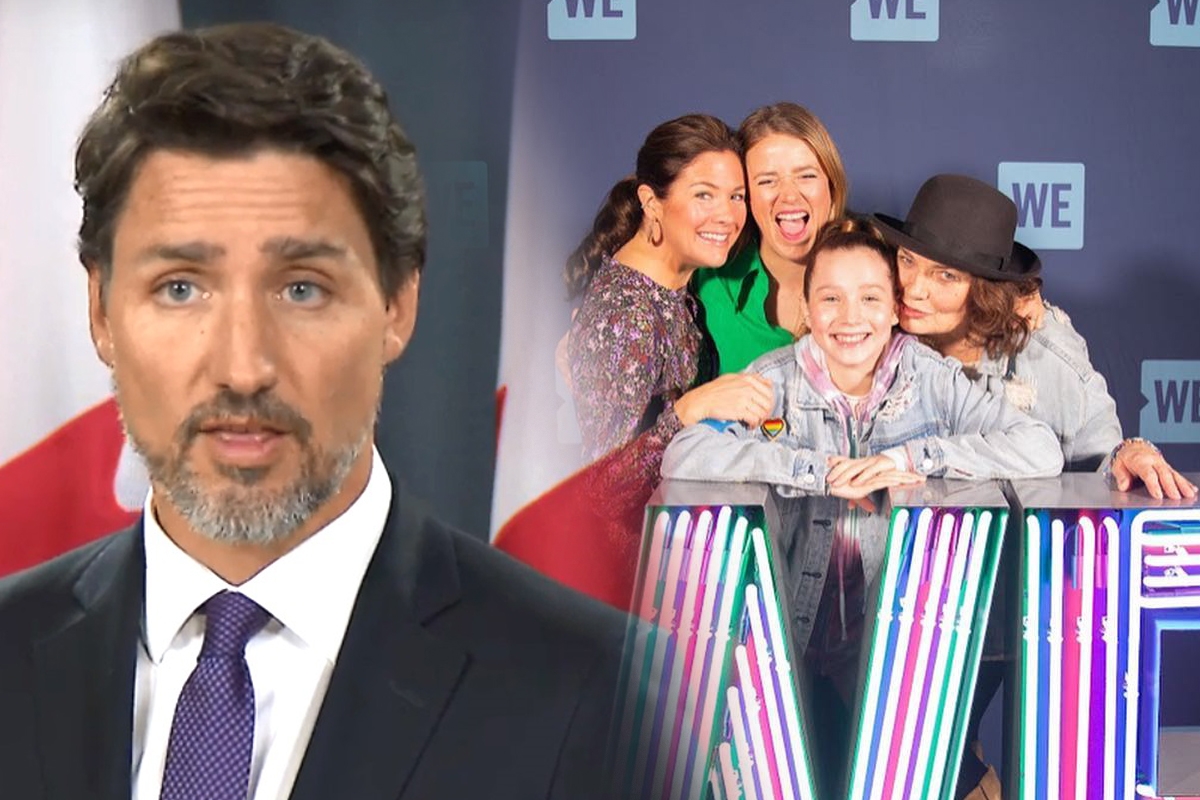
Understanding why the WE contract was just wrong
ABOVE: (LEFT TO RIGHT) Justin Trudeau, Sophie Gregoire-Trudeau, sister-in-law Alicia, daughter Ella, and Margaret Trudeau, at WE Day UK, March 4, 2020 (WE Movement via Facebook)
If it’s Friday in Ottawa in the summer, it must also be “take out the garbage” day. And so it was this morning that the Government of Canada and WE Charity mutually agreed to terminate their agreement that WE would administer the $912 million Canada Student Service Grant. The abrogation of the agreement does not however diminish the need to examine a number of fundamental issues that have been laid bare.
Cast your mind back to 2014. Imagine that the spouse of then prime Minister Stephen Harper, Laureen Harper – a well known advocate of animal welfare – had steered a $90 million sole source contract to an organization like Humane Canada to fund individual SPCAs across the country. Nothing wrong with helping to protect abandoned cats and dogs – right? Wrong! Just imagine the calumny that would have descended upon the Harper government and the Prime Minister himself. Charges of cronyism, friends in high places, unacceptable and unaccountable privatization or has been termed “charitization” of public spending would have been thrown across the aisle of a sitting Parliament.
But it is now 2020. The Prime Minister is Justin Trudeau, and the government has announced an agreement with a third party to administer a program budgeted at $912 million, 10 times larger than the fictional one noted above. In this case, the recipient is WE Charity, the chosen vocation of both the Prime Minister’s wife, and mother, and convenor of events such as WE Days, which he has also appeared at several times in the past decade. The agreement is to administer the Canada Student Service Grant (CSSG), a key component of the government’s $9 billion package to assist students struggling to find work in this pandemic in funding their educational pursuits.
The CSSG was announced on April 22nd and will provide grants of between $1,000 and $5,000 to registered or recently graduated post-secondary students who volunteer with a local organization. The grant is based upon hours committed, such that volunteering 500 hours would earn the full grant of $5,000; in effect $10 per hour. However, the contract with WE Charity was not revealed until June 25th when the CSSG was formally launched, and only in a backgrounder, not the Prime Minister’s prepared remarks. The Prime Minister declined to discuss terms of the WE contract, saying only that the public servants at Heritage Canada and Employment and Social Development Canada insisted that the WE group was the only organization in Canada that could quickly assemble a network to enroll up to 40,000 students in the matter of months before the program expires at the end of October. While later allowing that WE will receive $19.2 million for administering the program, the government has not released the terms of the agreement, and would not do so until after the program’s expiration. It is not even clear whether the agreement is based upon a sole source contract or a grant and contribution (G&C) agreement.
Leaving aside who asked whom for the first dance, and WE co-founder Marc Kielburger’s embarrassing retreat from his claim that the Prime Minister’s Office had called him to ask WE to take on the task of administering the grant program – gratuitous perhaps to suggest Mr. Kielburger experienced the call differently – this arrangement creates serious literal and perceptual issues respecting the responsibilities of the professional public service, the role of Parliament in appropriating funding, fairness with respect to the voluntary sector, public accountability for government spending, privacy and data collection concerns for applicants, and visibility for the Government of Canada.
Anyone who has worked in government or sought government work knows how frustratingly difficult the contracting process can be, particularly in the case of a non-competitive procurement. If in fact this is a sole source contract, it must be fully justified and recorded. As Treasury Board Secretariat’s Contracting Policy states, “the purchase must stand the test of public scrutiny in matters of prudence and probity, facilitate access, encourage competition, and reflect fairness in the spending of public funds”. Contracts for goods or services may be sole-sourced in emergency situations but even the Department of National Defence, if short fuel or ammunition, has a ceiling of $750,000 for sole source purchases or $7.5 million for competitive purchases. If a contract, the $19.2 million to be paid to WE far exceeds existing guidelines. If the agreement is based upon a G&C, the process is no less onerous, as a full Treasury Board submission and perusal by Cabinet Committee would be required. The heart of the TB submission would be the Terms and Conditions (Ts & Cs) that would spell out exactly how the funding may be spent. Yet, the Ts and Cs have not been released.
Interestingly, the portal to the CSSG is through the federal I Want To Help jobbank.gc.ca website framed in black with the ubiquitous red Maple Leaf flag. Applicants fill out a quick questionnaire to determine eligibility, and one then receives an email from a non-governmental site, not identified as WE, but from the CSSG team at Iwanttohelp.org. Doesn’t sound shady at all. The applicant then fills out a more detailed questionnaire relating to skills, talents, interests etc. that will assist the CSSG team in arranging a placement with a volunteer organization. This is where privacy issues come into question; for example, the question relating to gender has 7 possible answers, in addition to Prefer Not To Answer. As to whether the applicant identifies as someone from a visible minority or racialized community, one is presented with 14 options, with racialized communities described as “groups of people who have been socially constructed … based on characteristics such as ethnicity, language, religion, and culture”. It is not clear who will own this data once mined, and whether it will be sealed within this program. Could WE use it for further recruitment, fundraising, or advocacy efforts?
Finally, it has been revealed in the past couple of days that WE will be paying teachers up to $12,000 to recruit 65 students to the program in urban areas and the same amount for 55 students in rural areas; raising myriad questions as to the responsibility to students on behalf of teachers, and the appropriateness of teachers receiving such a commission for what has long been expected in terms of mentorship and guidance roles with their students. In addition, WE Charity itself has listed 450 volunteer openings on the government portal that students may apply for; questionable insider trading at the very least.
So, where are we? The Government of Canada has sole-sourced the administration of a near $1B program with an administration fee of $19.2M to a charity closely associated with the Prime Minister and his family. Irrespective of Cabinet directives, these amounts far exceed generally accepted exemptions to federal contracting rules. The administration of the program places it beyond the already limited purview of Canada’s weak Access to Information laws, and other than a few sitting days this summer, Parliament stands adjourned until late September. There will be no oversight. The very capable federal Employment and Social Development Department has been sidelined, despite moving heaven and earth along with CRA and Service Canada, to ensure eight million Canadians would receive the Canada Emergency Response Benefit of up to $2,000 monthly. For this, Employment Minister Carla Qualtrough deserves a major Cabinet promotion. Instead, given the Prime Minister’s penchant for creating ministers without real responsibilities, the CSSG was given to Bardish Chagger, Minister for Diversity, Inclusion and Youth housed within the Department of Canadian Heritage.
The government reports that more than 20,000 young people have already applied for the program; yet the WE site that accepts applications only become operational as of June 25th. How many of these applicants applied to the program before then, and will WE still be paid a fee for their participation? The Government of Canada maintains the “service opportunities” website which includes 450 WE Charity opportunities in addition to thousands at many other worthy charities across the country. Why couldn’t applicants make their own linkages through the federal jobbanks website, eliminating the need for a middle-man, in this case WE? These are just a sampling of the governance issues raised by this questionable arrangement.
Principles and customs such as ministerial accountability, transparency, probity, and the public good may seem fusty and quaint in today’s world, but they are absolutely fundamental to our system of government. They underpin our democracy, and have served Canada well through its first 153 years. Unconscious or not, this agreement erodes each of these traditional values of governance, in addition to calling into question the role of government itself.
I have attended two WE-Days in Ottawa and other smaller WE and Free the Children events. I’ve met Spencer West and other incredibly talented and inspirational WE motivators, and thrilled to their stories. The young people I worked with raised money for African school construction and in doing so, passionately embodied the spirit of Me to We. Sadly though, WE’s arrangement with the Government of Canada to deliver this important aid to students lacks any such ideals. The masthead of the WE website reads “We’re in this together”. Since the pandemic lockdown began in March, the Prime Minister has also said these words many times. Yes, they certainly are.








